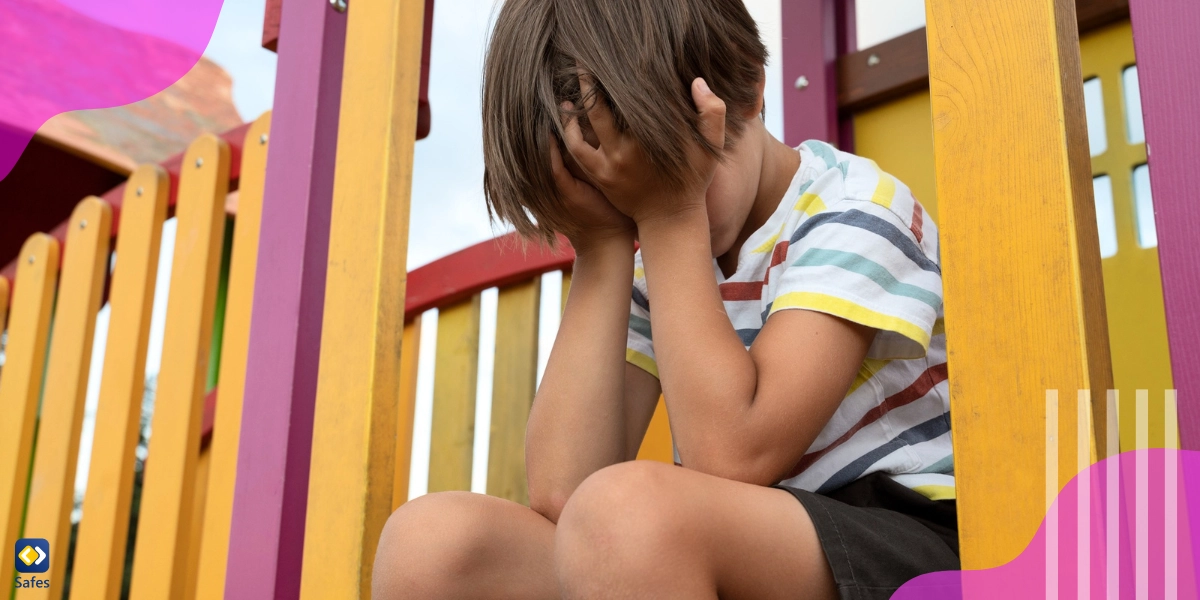Among the most prominent fears of a child is the fear of rejection. They may worry whether other people will like them or not or be unable to participate in games or try new things because of this fear. However, parents have the responsibility of assisting children in discovering their inner strength and confidence.
Download and Start Your Free Trial of the Safes Parental Control App
Children’s fear of being rejected often causes low self-esteem, which leads to children having doubts about their values and in turn experiencing social anxiety. Moreover, they may have academic difficulties, and struggle with emotional distress.
However, by implementing specific strategies, parents can help their children manage this matter. Continue reading this blog to learn how to overcome the fear of rejection in children after recognizing its signs.
Recognizing the Telltale Signs of Fear of Rejection in Children
The fear of rejection often has its roots in childhood trauma. When a child is suffering rejection anxiety, they may show a variety of behaviors. Depending on the child’s age, personality, and situation, these indications may change. Fear of rejection signs include the following:
- Social withdrawal: Children may grow more isolated and reluctant to engage in social activities. They might avoid social gatherings, parties, and even school functions.
- Low self-esteem: Children’s self-esteem can be damaged by the continual worry of being rejected. They may express self-doubt, engage in negative self-talk, and generally have a negative view of themselves.
- Perfectionism: A perfectionist personality can be a result of rejection anxiety. To avoid failure or possible criticism, children may avoid tasks or challenges they feel they cannot thrive on.
- Overly sensitive to criticism: Even moderate criticism may cause children to respond angrily, as they may take it personally and become sad.

How to Get Over Fear of Rejection
Overcoming the fear of rejection in children may take time and this progress may vary from child to child. Here are some strategies to help children build resilience and conquer this fear.
Art Projects for Resilience
For children who are coping with rejection anxiety, art therapy can be quite beneficial. It gives them a creative and expressive outlet that can aid them in the processing of their feelings, enhancing resilience, and improving their emotional well-being in the context of this fear. Here are some suggestions for age-appropriate art projects:
Children (Ages 3-5):
- Feelings masks: Allow children to customize masks to express various emotions. Talk about how each emotion feels and when they may experience it.
- Finger painting: Finger painting is an expressive and tactile hobby for children.
Children (Ages 6-8):
- Storytelling with art: Use pictures or paintings to help children develop a visual story about a character who faces and overcomes obstacles like fear of rejection in love.
- Feelings journals: Give your children little sketchbooks or notebooks so they can draw or paint every day or every week to express their feelings.
Children (Ages 9-11):
- Emotion mandalas: Help children make mandalas with each piece standing for a distinct feeling. Talk about their emotional landscape and the fear of rejection.
- Collage poetry: Encourage children to make collages using words and images to express their feelings about rejection.
Role-Playing Games for Confidence
Role-playing games are a great way for children to practice social skills and gain confidence. Especially when it comes to overcoming rejection fears. Children can experiment with social relations in a safe and controlled atmosphere provided by role-playing games without worrying about the real world’s consequences.
They are free to experiment with different scenarios, make mistakes, and learn from them without worrying about being rejected right away.
Nature Outings for Self-Discovery
The healing power of nature, sometimes known as “ecotherapy” or “nature therapy”, has been demonstrated to significantly lower stress and anxiety in children, even those who are suffering from the fear of rejection. Hiking adventures, picnics in the park, and beach exploration are some types of nature-outs that promote resilience in children.

Combining Activities for Maximum Impact
Parents can incorporate all three types of activities including art projects, role-playing games, and nature outings into their children’s daily schedule to help them overcome fear of rejection. Combining these activities results in a comprehensive strategy for fostering children’s emotional stability, self-worth, and resilience. Let’s clarify it by demonstrating an example:
As we mentioned above, nature’s outgoings can help children overcome the fear of rejection. When a family regularly goes on nature outings or camping trips, they encourage their children to help set up camp and overcome practical problems when on camping outings. These encounters help children develop their problem-solving abilities while also boosting their self-confidence. Moreover, their resilience is being fostered as they discover they can overcome challenges and adapt to different situations.
The Role of Parental Control Apps
Parental control apps can play a crucial role in addressing the fear of rejection in children, especially when it comes to regulating children’s online behavior and social connections. These apps can assist parents in establishing a secure online environment while striking a balance between monitoring and protecting children’s privacy.
Parents can use the default parental controls on children’s devices. Read our resource pages to get more information:
- Android parental controls
- iPhone parental controls
- Windows parental controls
- MacBook parental controls
Moreover, parents can use a third-party parental control app like Safes; then can monitor their children’s online activities, manage their screen time, and block all apps instantly. You can download it for free on iOS and Android. Sign up for a free trial today and explore how it can help you manage your online activities effectively. Sign up for a free trial today and explore how it can help you manage your online activities effectively.
Conclusion
Overall, overcoming a child’s fear of rejection is a complex process that calls for a considerate and sympathetic approach. We have mentioned several methods such as nature outings, art projects, and installing a parental control app on how to get over the fear of rejection in children. Incorporating these activities into a child’s daily schedule offers a comprehensive framework for fostering emotional well-being.
Your Child’s Online Safety Starts Here
Every parent today needs a solution to manage screen time and keep their child safe online.
Without the right tools, digital risks and excessive screen time can impact children's well-being. Safes helps parents set healthy boundaries, monitor activity, and protect kids from online dangers—all with an easy-to-use app.
Take control of your child’s digital world. Learn more about Safes or download the app to start your free trial today!




